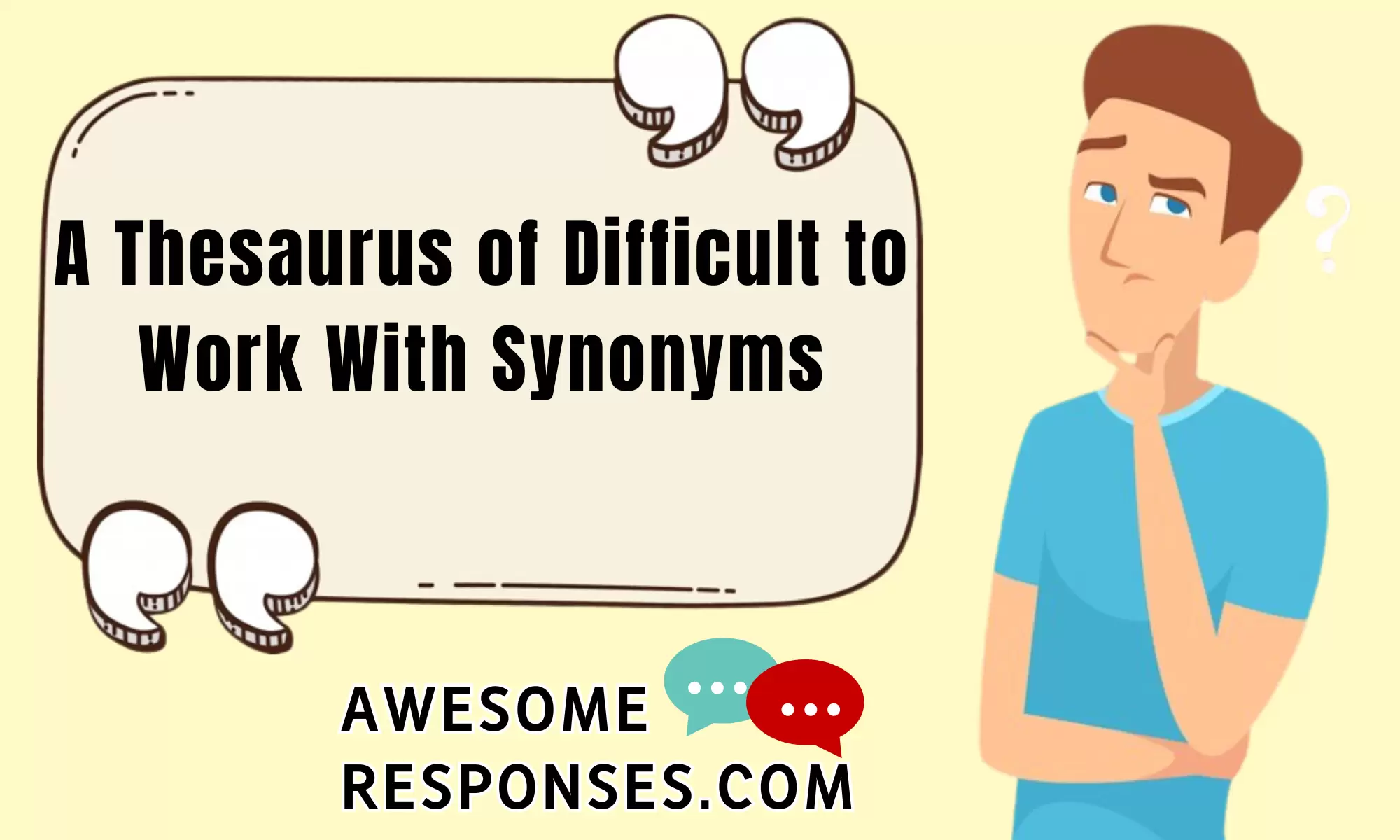In the dynamic landscape of professional interactions, effective communication is the cornerstone of success. However, there are instances when we encounter colleagues or team members who pose a unique set of challenges, making collaboration challenging.
In this article, we’ll delve into 25 Difficult to Work with Synonyms that encapsulate the diverse range of personalities and behaviors that can test our patience and adaptability in the workplace.
List of Navigating Workplace Challenges: A Thesaurus of 25 Difficult to Work With Synonyms
- Challenging
- Uncooperative
- Obstinate
- Stubborn
- Intractable
- Contrary
- Headstrong
- Unyielding
- Recalcitrant
- Obstreperous
- Refractory
- Defiant
- Restive
- Cantankerous
- Difficult
- Troublesome
- Disobliging
- Unmanageable
- Obstropolous
- Perverse
- Unamenable
- Pig-headed
- Unaccommodating
- Contradictory
- Disagreeable
1. Challenging
Navigating a professional setting often involves overcoming obstacles, and some individuals can be particularly demanding. The term challenging encapsulates situations where coworkers may present formidable hurdles, requiring innovative solutions and a resilient mindset.
Dealing with a challenging colleague might involve finding common ground, understanding their perspective, and fostering open communication. Despite the complexities, overcoming challenges can lead to personal and professional growth.
2. Uncooperative
When collaboration is hindered by resistance or unwillingness, you might be dealing with an uncooperative individual. This suggests a reluctance to work together, necessitating diplomatic approaches to foster a more cooperative environment.
Encountering uncooperative behavior may require assertiveness and tact. Acknowledge concerns, emphasize shared goals, and seek compromise to encourage a more collaborative spirit.
3. Obstinate

In the realm of workplace dynamics, encountering someone who is obstinate can be particularly challenging. This term implies stubbornness and a strong resistance to changing opinions or perspectives.
Addressing obstinacy may involve presenting well-reasoned arguments, offering alternative viewpoints, or seeking mediation. The key is to navigate differences while maintaining a respectful and constructive dialogue.
4. Stubborn
When faced with inflexibility and an unwavering commitment to a particular stance, you might be dealing with a stubborn colleague. This trait can impede progress and requires strategies to encourage flexibility.
Engaging in open conversations about the benefits of adaptability and showcasing the advantages of considering alternative approaches can help loosen the grip of stubbornness in a professional setting.
5. Intractable
Encountering individuals who are unyielding and resistant to change can be described as dealing with an intractable personality. This term underscores the difficulty in persuading or influencing such individuals.
Addressing intractability often involves identifying common ground, presenting evidence, and emphasizing the collective benefits of adapting to new ideas. Patience and persistence are key when working with intractable colleagues.
6. Contrary
A contrary colleague often seems to oppose ideas or suggestions without apparent reason. This behavior can be perplexing, requiring careful navigation to foster a more cooperative atmosphere.
Understanding the motivations behind contrary behavior is crucial. Engage in open conversations to uncover concerns, highlight shared goals, and find common ground to create a more harmonious working relationship.
Read More: Funny Things to Say When a Girl Rejects You
7. Headstrong
In a professional context, a headstrong individual is determined and often insists on their own way. While determination can be admirable, an excessively headstrong approach may lead to clashes in a collaborative setting.
Addressing headstrong behavior involves acknowledging the individual’s strengths while encouraging flexibility and openness to others’ ideas. Collaboratively finding solutions can turn a headstrong colleague into a valuable team player.
8. Unyielding
Dealing with an unyielding colleague requires strategies to navigate their steadfastness. This term suggests a firmness that can hinder compromise, necessitating creative approaches to encourage flexibility.
Highlighting the benefits of adaptability and framing changes as opportunities rather than threats can help soften the stance of an unyielding colleague. Fostering a culture of open dialogue is also crucial in such situations.
9. Recalcitrant
Encountering a recalcitrant individual implies facing resistance to authority or control. This term suggests a defiance that may require careful handling to foster a more cooperative and constructive relationship.
Addressing recalcitrance involves understanding the root causes of resistance, providing clear expectations, and offering support. Building trust and demonstrating mutual respect are essential for overcoming recalcitrant behavior.
10. Obstreperous
When faced with someone who is obstreperous, you’re dealing with a person who is noisy, difficult to control, or resistant to direction. This term emphasizes disruptive behavior that can hinder teamwork.
Addressing obstreperousness involves setting clear boundaries, emphasizing the importance of collaboration, and offering constructive feedback. Creating a positive and inclusive team culture can help mitigate obstreperous tendencies.
11. Refractory

Encountering a refractory individual suggests dealing with someone resistant to discipline or control. This term implies a challenging attitude that requires a strategic and empathetic approach to foster positive change.
Addressing refractory behavior involves providing clear expectations, offering constructive feedback, and implementing consequences when necessary. Establishing a supportive environment can aid in transforming refractory attitudes.
12. Defiant
When faced with a defiant colleague, you’re dealing with someone who openly resists authority or challenges established norms. Addressing defiance requires a balance between assertiveness and understanding.
Engaging in open and respectful conversations, addressing concerns, and finding common ground can be effective strategies for managing defiant behavior. Encouraging autonomy within established boundaries can also be beneficial.
13. Restive
A restive individual may exhibit impatience or unease, making collaboration challenging. This term suggests a restless nature that requires careful attention to communication and strategies to create a more comfortable working environment.
Addressing restiveness involves acknowledging concerns, providing clear expectations, and creating opportunities for meaningful contributions. Fostering a sense of purpose and inclusivity can help alleviate restive tendencies.
14. Cantankerous
Dealing with a cantankerous colleague means handling someone who is often ill-tempered or quarrelsome. This term implies a challenging disposition that may require patience and effective communication strategies.
Addressing cantankerous behavior involves maintaining a calm demeanor, actively listening to concerns, and finding common ground. Building rapport and demonstrating empathy can contribute to improved relations with a cantankerous colleague.
15. Difficult
The term difficult is a broad descriptor that encompasses various challenging behaviors. Addressing difficult colleagues requires a nuanced approach, considering the specific traits that contribute to the challenging dynamics.
Tailoring communication strategies, seeking common ground, and fostering a collaborative mindset are essential when dealing with difficult individuals. Emphasizing shared goals can contribute to a more positive working relationship.
16. Troublesome
Encountering a troublesome colleague implies facing someone who causes difficulty or disruption. Addressing troublesome behavior involves identifying specific issues, offering constructive feedback, and collaboratively finding solutions.
Creating an open and supportive environment where concerns can be addressed proactively is crucial when dealing with troublesome colleagues. Establishing clear expectations can help mitigate disruptive tendencies.
17. Disobliging
A disobliging colleague may exhibit a lack of willingness to assist or be cooperative. This term suggests a reluctance to go beyond basic requirements, requiring strategies to encourage a more supportive attitude.
Addressing disobliging behavior involves highlighting the benefits of collaboration, acknowledging contributions, and fostering a sense of shared responsibility. Encourage open communication to understand any underlying reasons for the disengagement. By creating an environment where each team member feels valued, you can often transform a disobedient demeanor into one of collaboration.
18. Unmanageable
When faced with an unmanageable colleague, the challenge lies in dealing with someone who is difficult to control or handle. This term underscores the importance of finding effective strategies to manage unpredictable behavior.
Addressing unmanageability requires a combination of clear expectations, consistent feedback, and establishing boundaries. Implementing structured processes can help bring order to situations where chaos may otherwise prevail.
19. Obstropolous
Encountering an obstropolous individual signifies dealing with someone who is difficult, unruly, or unmanageable. This term emphasizes disruptive behavior that may require innovative approaches to foster a more harmonious team dynamic.
Addressing obstropolous behavior involves understanding triggers, offering constructive feedback, and creating a supportive team culture. Encouraging emotional intelligence and conflict resolution skills can also contribute to smoother interactions.
20. Perverse
A perverse colleague may exhibit a deliberate desire to behave in an unreasonable or contrary manner. Addressing perversity involves understanding motivations, offering clear expectations, and fostering an environment that discourages negative behavior.
Creating a workplace culture that values cooperation and constructive communication is essential when dealing with perverse individuals. Encourage collaboration and highlight the positive outcomes of working collectively to mitigate perverse tendencies.
21. Unamenable
When faced with an unamenable colleague, the challenge lies in dealing with someone who is unresponsive or resistant to suggestions. This term emphasizes the importance of finding diplomatic ways to encourage openness and receptivity.
Addressing unamenable behavior involves showcasing the benefits of adaptability, actively seeking input, and creating opportunities for collaboration. Emphasizing shared goals can foster a more amenable and cooperative working relationship.
22. Pig-headed
Dealing with a pig-headed colleague involves managing someone who is excessively stubborn or obstinate. This term conveys a sense of resolute inflexibility, requiring creative approaches to encourage a more open-minded attitude.
Addressing pig-headedness may involve humor, acknowledging differing perspectives, and finding common ground. Encourage a willingness to consider alternative viewpoints, fostering a more cooperative and inclusive team environment.
23. Unaccommodating
An unaccommodating colleague may be resistant to adapting or making concessions. This term underscores the challenge of fostering a collaborative environment when faced with a lack of flexibility.
Addressing unaccommodating behavior involves emphasizing the benefits of compromise, actively listening to concerns, and seeking mutually beneficial solutions. Encourage a culture of adaptability and openness to create a more accommodating workplace.
24. Contradictory
When dealing with a contradictory colleague, you’re navigating someone who consistently opposes or challenges ideas. Addressing contradiction requires a balance between assertiveness, understanding, and effective communication.
Engaging in respectful conversations, acknowledging opposing viewpoints, and finding common ground can be effective strategies for managing contradictory behavior. Encourage a culture of open dialogue to foster understanding and collaboration.
25. Disagreeable
Encountering a disagreeable colleague means dealing with someone who is often unpleasant or difficult to get along with. This broad term requires a nuanced approach, considering the specific behaviors that contribute to the challenging dynamics.
Addressing disagreeable behavior involves maintaining professionalism, setting boundaries, and seeking common ground. Encourage open communication to understand concerns and actively work towards building a more agreeable working relationship.
Conclusion
In the intricate tapestry of professional relationships, the ability to navigate challenging personalities is a valuable skill. Each of the 25 Difficult to Work with Synonyms presented here encapsulates a unique facet of workplace challenges.
Whether you’re dealing with stubbornness, resistance to change, or disruptive behavior, effective communication, empathy, and a proactive mindset are essential tools for fostering positive working relationships.
By understanding the nuances of these synonyms, you can approach workplace challenges with a strategic and adaptable mindset, turning potential conflicts into opportunities for growth and collaboration.

I’m Dariel Campbell, the expert in charge of making things hilariously awesome at “Awesome Responses.” Playing with words and delivering quick, clever comebacks is my thing. At Awesome Responses, we’re here to make your replies stand out and shine. Let’s make your responses quick, clever, and uproariously funny—come and join the hilarity at Awesome Responses!












